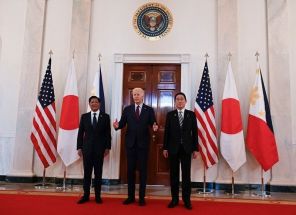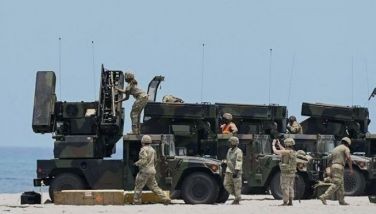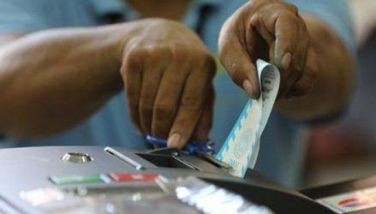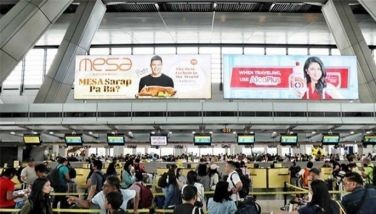Duterte won’t name, probe corrupt congressmen
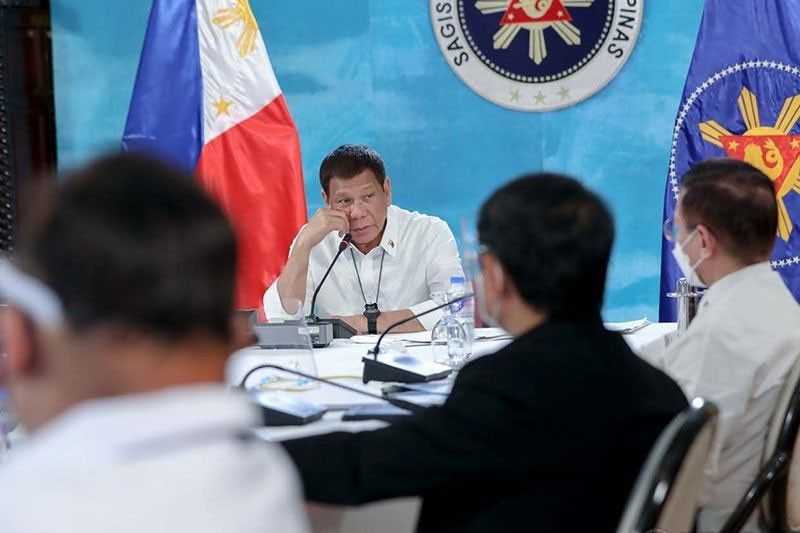
MANILA, Philippines — President Duterte won’t name lawmakers allegedly benefiting from corruption in government projects, saying he cannot investigate members of a separate and co-equal branch of government.
The Presidential Anti-Corruption Commission (PACC) reported last month that some lawmakers were using their influence to control the implementation of local projects and are colluding with public works personnel and contractors to commit corruption. PACC Commissioner Greco Belgica has declined to provide specifics but has submitted the list of lawmakers to Duterte.
Speaking at a meeting with the Inter-Agency Task Force for the Management of Emerging Infectious Diseases (IATF) in Davao City on Monday, Duterte confirmed that the PACC has informed him about the lawmakers who were supposedly asking commissions from project contractors.
The President, however, said he could not investigate the lawmakers as doing so would be an encroachment on legislative powers.
“Let’s go to political law. I have no business investigating congressmen. They belong to a separate organ of government, which is co-equal with the President and the Supreme Court,” Duterte said.
“If I cannot investigate the congressmen, then I have no authority to be releasing their names per investigation by the PACC,” he added.
If the list is given to him, Duterte said he would have no other recourse but to send it to the ombudsman because it is “the only investigating agency that has jurisdiction over congressmen.”
Justice Secretary Menardo Guevarra, who was present during the task force meeting in Davao City, pointed out that a lawmaker is not the one being investigated but a transaction involving any government personnel who is outside the executive branch. If a transaction is probed and, in the course of the investigation, some members of Congress are found to be involved in a corrupt practice or transaction, it is within the power of the investigating body to mention them, Guevarra added.
Duterte said all individuals involved in corrupt practices, including contractors, should be investigated.
“We cannot have a separate (probe) because of the findings.... Well, for example, we have jurisdiction over the contractor, and then there’s the congressman... The decision may be different. Maybe exonerating the congressman or exonerating the contractor and making the congressman liable,” the President said.
“If the transaction is germane to the particular congressman…he should answer for that... Now, whether or not they can themselves independently of me release the names, I said, no. Just send the list to me, the result of the investigation, then I will give it to the secretary of justice, to Secretary Guevarra, for him to make the proper endorsement to the ombudsman.”
Duterte clarified that he was not protecting anyone when he decided not to reveal the identities of lawmakers involved in corruption.
“I am not afraid and I am not covering up for a congressman.... Now when the time comes, I will ask the secretary of justice to review it. But the review will just be a cursory reading...because...he does not have the jurisdiction either, he will pass it on to the ombudsman,” he said.
Not same as narco list?
Duterte, however, had disclosed the names of officials believed to be involved in the illegal drug trade even if they are not part of the executive branch. In 2016, the President made public a “narco list” that contained the names of judges and lawmakers.
Asked how different the narco list was from the list of lawmakers receiving kickbacks from government projects, presidential spokesman Harry Roque claimed it is easier to establish the wrongdoing of those into illicit drugs.
“I think it’s evidentiary. The President said because this is an issue of evidence, it would be better if the investigation is conducted by the ombudsman because the jurisdiction of the ombudsman covers all people in government, not just the executive, legislative or judiciary,” Roque said.
“When it comes to the judges, perhaps the President himself saw the pieces of evidence against the judges as a former prosecutor. It’s easy. If there is evidence proving an allegation that a judge received a bribe to acquit a drug lord, the President thinks that evidence will stand,” he added.
Roque said several pieces of evidence are needed to prove that biddings were rigged to favor a contractor backed by a lawmaker.
“The President does not possess these pieces of evidence, unlike the evidence that a judge received a bribe, which is easy to establish,” the Palace spokesman said.
“So I can only surmise it is evidentiary; and number two, he stands by what he said that this entails separation of powers.”
Pressed on which instances can the President investigate lawmakers, Roque said it can be done if the offenses are “not within the primary jurisdiction of the ombudsman.”
“When it entails, for instance, heinous crimes involving violations of the anti-drugs law of the country, then the Executive can of course investigate that,” Roque said.
“We lawyers tend to have specializations and even fiscals, prosecutors also have specializations. We have special prosecutors for Anti-Graft law, these are the ombudsman lawyers; we have specialized prosecutors for drugs, we have specialized prosecutors for trafficking. The more experienced you are with the field of law, the higher the conviction rate,” he added.
Roque also defended Duterte’s public statements against opposition Sen. Leila de Lima, who is now in jail over drug-related charges.
“As I said, it must be evidentiary. In the case of Leila de Lima, the evidence is strong that she was really involved in the drug trade. Eleven witnesses testified against her,” the Palace spokesman said.
“As lawyers, you can evaluate evidence for yourself. The President is a former public prosecutor. Leila de Lima’s liability when it comes to illegal drug trafficking is brighter than the sun,” he added.
Roque also pointed out that the Office of the President cannot probe more than 300 lawmakers.
“As for Leila de Lima, she is one of a kind,” he added.
In a tweet, De Lima said Duterte should review his political law, saying the justice department and the National Bureau of Investigation probed the pork barrel complaints against Sen. Ramon Revilla Jr. and former senators Jinggoy Estrada and Juan Ponce Enrile.
Asked to react to the statement, Roque replied: “Let her be. She has no one to talk to.”
BIR dismissals
In his televised address after the IATF meeting, Duterte again reminded the nation of his resolve to stop corruption in the bureaucracy and announced names of 26 Bureau of Internal Revenue (BIR) employees dismissed for various offenses, particularly pocketing taxpayers’ money ranging from over P100,000 to P6 million.
The President declared his “purge” in government will “continue till the end of my term” in 2022.
He maintained he has already dismissed at least 300 government workers for graft and corruption.
“You listen to me (expletives). You better stop now, just now. In the next administration – fine; you may go back to your old ways, I don’t care anymore,” he said in Filipino.
Among the dismissed BIR employees were Rolando Cruz and Rachel Doton – for grave misconduct and dishonesty. Doton failed to remit cash collection of P406,757.22.
One Meralina Salise was also dismissed for dishonesty and misconduct for unremitted collection of P6,278,555. Oscar Tajonera was dismissed for the same offense, but involving a smaller amount of P242, 815.
One Rolando Mirasol was terminated for grave misconduct – for illegally obtaining money by deception, as well as one Rodulfo Suello. Also dismissed were Pilarica Teng, for pocketing P110, 000; Mildred Cabral, P1,144, 807; Emma Mendoza, P800,000; Renaldo Santos, P1 million and Hilario Boacon, P1 million.
Others dismissed for unremitted collection were Marlene Caraos for P379,355, as well as Hadja Jawada Ismael and Oliver Pador.
Also sanctioned for unremitted cash collections and conduct prejudicial to the service were Fausto Balmaceda, Nicolas Aquino, Rolando Mondares, Suzie Corpuz, Edmundo Uy and Gary Anatacio.
BIR employees dismissed for extortion, falsification of certificate authorizing registration, among other offenses, were Arturo Boniol Jr., Rebecca Viray, Hermogenes Elvena, Adoracion Ganaban and Marina Asetre. One Gloria Naval was terminated for malversation.
Duterte said those he named were already found guilty. “Do not – do not blame anybody except yourself. You brought it to yourself to bear,” he said.
Weeks ago, the President enumerated names of personnel and officers of the Bureau of Immigration, Bureau of Customs and Department of Transportation, who were suspended or dismissed for corrupt practices.
“So you have to deal with these two – dismissal from service, loss of job and imprisonment. That’s what will happen,” he said. “Now next week, there will be more” names, he added. – Edith Regalado
- Latest
- Trending























